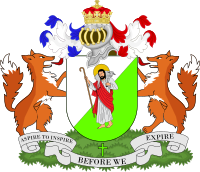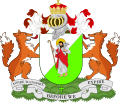Maslow Initiative
| Maslow Initiative Act | |
|---|---|
 | |
| New Eiffel Transitional Legislature | |
| Legislative Bill Proposal to initiate the Maslow Initiative | |
| Citation | Citation |
| Territorial extent | Principality of New Eiffel |
| Legislative history | |
| Bill | Legislative Bill Proposal to initiate the Maslow Initiative |
| Bill published on | 9 May 2020 |
| Introduced by | Leon Montan |
| First reading | 9 May 2020 |
| Summary | |
| Legislative Bill followed by Parliament that mandates and guidelines method of initiation of the Maslow Initiative and underlying phases. | |
| Status: Not yet in force | |
| Part of a series on the |
| Crisis in New Eiffel |
|---|
 |
| Overview |
| Constitution of New Eiffel • Inflation • Diplomacy • Maslow Initiative |
| Events |
|
2019–2020 Constitution Crisis • 2020 political crisis • Abdication of Zabëlle I • Possible civil war threat Related Suspend Parliament Act 2019 • Response to the COVID-19 pandemic • Death of Nicholas Randouler |
| Elections |
| 2019 • May 2020 • October 2020 |
| Aftermath |
| Dissolution of New Eiffel • Proposed merge with Garuda • Kingdom of True New Eiffel |
| People |
| Zabëlle Skye • Christina Nowell • Nicholas Randouler • Isaac Richards • James Frisch • Jayden Lycon • Janus Smith • Leon Montan |
The Maslow Initiative was a proposed plan by Issac Richards that mandates and guidelines the New Eiffel Transitional Legislature into working on reforming the government system and society along with culturally enriching the nation - the initiative had a number of phases that would be implemented in a chronological order based on Maslow's hierarchy of needs. The initiative received informal approval from Prince Zabëlle I upon a summary of the act before it was finalised; during the enactment session, Leon Montan of the New Eiffel Labour Party gave official assent of said act as well.
Background
Planning of Issac Richards' Maslow Initiative has been around in existence since early Early May 2020 in which he proposed the idea in private conversations with Leon Montan and Zabëlle I, in which both persons appealed to the idea; who both also appealed to a previously failed motion to create a Language and Culture Ministry also proposed by Issac Richards.
A list of the idea and how it'd work if initiated was publicised in the Transitional Citizens Forum on 6 May 2020; it was then met with a suggestion that a fully-fledged bill would be required for a proper vote to take place. The proper bill was finalised on 8 May 2020 and published for voting on 9 May 2020 - the same day it was voted in favour of.
Phases of the Maslow Initiative
Phase #1: Safety (Safety Needs)
Phase #1 of the Maslow Initiative focused on the security and safety of New Eiffel's government and citizens, ideas included reformation of internal politics and its functions to be more effective, development of laws protecting freedoms and democracy acts to protect the government from potentially negative extreme reforms. These laws would guarantee the safety of New Eiffelians in the country.
Suggested actions included:
- Acts that could encourage redevelopment of the Parliament and its functions to be more effective (Development of new departments).
- Acts to protect the government from potentially negative extreme reforms (e.g. only having a base of laws that can be permanent – and making sure all other laws are not permanent unless they hit a criteria).
- Guaranteed protection of democracy and freedom.
Phase #2: Belonging (Belongingness and Love needs)
Phase #2 of the Maslow Initiative focused developing New Eiffel community and society; policies encouraging interaction of citizens and encouragement of social life within New Eiffel, such acts would go under the Gemeinschaft (community) and Gesellschaft (society) subcategories. These policies would encourage social belonging.
Suggested actions included:
- The creation of a public forum or server that encourages citizens to interact based on common interests and beliefs. (Gemeinschaft)
- The creation of a radio/TV talk show that encourages chat. (Gemeinschaft/Gesellschaft)
- The creation of an interactive TV Station/YouTube channel. (Gemeinschaft/Gesellschaft)
- The promotion of nationalism. (Gesellschaft)
Phase #3: Esteem (Esteem needs)
Phase #3 of the Maslow Initiative focused on improvisation on New Eiffel's Foreign Policy and recognition of prestige in New Eiffel. These policies would directly develop status and promote the value of citizens in New Eiffel but could also indirectly promote Gemeinschaft, Gesellschaft and Nationalist policies.
Suggested actions included:
- Reformation of New Eiffel Foreign Policy (not explicitly listed)
- New Eiffelic Effort Awards (referenced)
Phase #4: Self-actualisation
The final phase of the Maslow Initiative focused on the development and enrichment of national culture. These policies would promote utilisation and development of New Eiffelic talents to contribute to the creation of national culture. These policies would indirectly contribute to Esteem policies.
Suggested actions included:
- A National Television Channel Act (To create a National Television)
- A National Newspaper Act (To create a National Newspaper)
- The Sponsored Creation of unique New Eiffelic Arts (TV Shows, Movies, Art, etc.)
- The Sponsored Creation of Foreign Arts localised to New Eiffel (Fandubs, Fansubs, etc.)
- The Teaching of recognised languages in Schools (e.g. Afrikaans)
- The Creation of a Ministry of Culture, Language and Media (and related departments)
Similarities to the Motion to Create a Language and Culture Ministry
The Self-actualisation phase stems an earlier motion to create a Language and Culture Ministry.which failed in a 1:3:1 vote (Aye - Nay - Abstain), in which MTL members Judge Corvin and Christina Nowell agreed that it "doesn't seem exactly necessary right about now" [sic]. Phase #4 of the Maslow Initiative refer to the Ministry of Culture and the Ministry of Language as separate ministries, there are no specific laws however that say that the ministries have to be separate.
Act
The Maslow Initiative Act is an act of the New Eiffel Transitional Legislature that initiates the proposed Maslow Initiative. The act succeeded in the Transitional Legislature after a vote by 4 MTLs (3 in favour; 1 opposing).
Legislative Bill Proposal to Protect Citizens of New Eiffel (New Eiffelian Human Rights Act)
The New Eiffelian Human Rights Act was the first proposed subordinate legislation under the Maslow Initiative (by Issac Richards) - this act imposes a rigid constitution and prevents "any degree of power allowing the extreme reformation of a state" [sic].
Article #1
Article #1 of the bill also enforces the rewriting of New Eiffel's constitution, which "must explicitly include articles based on the Universal Declaration of Human Rights", a criteria that allows the creation of permanent laws and the protection of laws (protected bills). Article #1 of the bill also specifies new terms such as constitutional bills (bills passed in the Council) and protected bills (permanent laws); the article also mentions that New Eiffelian Royalty can also participate in running in elections as long as they renounce their royalty if they become the First Minister (marginally similiar to Cloistered rule).
Article #2
Article #2 of the bill ensures that all nations New Eiffel participate with in diplomacy are either;" protecting human rights", "and if not are willing to accept constructive help from New Eiffel to eventually implement all human rights into their nation including what’s specifically on New Eiffel’s Constitution and if not then the Universal Declaration of Human Rights. It also declares that "Failure of New Eiffel to do condemn nations otherwise- is a violation of human rights.".
Article #3 (Final Provisions)
Directly from the bill:
- The New Eiffelic Constitution must protect all rights of the citizen according to the Universal Declaration of Human Rights.
- The New Eiffelic Constitution must be rigid to protect the stability of the state.
- The New Eiffelic Constitution must have the specified criteria to allow bills into the permanent constitution to further protect human rights.
- The New Eiffelic Constitution must protect the state from transitioning to extreme governments.
- New Eiffelic Royal Blood may freely participate in political affairs (except the King, limited to the power of a MP albeit with Veto powers) as long as they renounce Royalty when they enter Parliament.
- New Eiffel must guarantee human rights to the citizens of countries they communicate with (or at least help countries introduce human rights to the citizens) otherwise they are breaking human rights.
- The New Eiffelian Human Rights Act is automatically a constitutional bill once implemented.
The New Eiffelian Human Rights Act declares to aid "development [of] the Maslow Initiative under Phase #1 (Safety) and Phase #3 (Esteem).". Phase #1 of the Maslow Initiative focuses on the security and safety of New Eiffel's government and citizens; this act had imposed reformation of New Eiffel's political system, the development of a constitution that protects freedoms and democracy acts and protects the government from extreme reforms. The act has also imposed the improvisation on New Eiffel's Foreign Policy.
Voting
The act succeeded in an unanimous vote by the Transitional Council after a vote by 4 MTLs (all 4 in favour).
Controversy
The Maslow Initiative Act was rendered unclear by MTL Christina Nowell (who opposed the act) claiming the act was ineffective, quoting that "This vote doesn't do anything", this was due to wording in the document that Nowell interpreted as suggestions to Parliament instead of laws that should be implemented. It was later confirmed that the act "mandated the government to implement the initiative, but the bullet points were just suggestions" meaning that the points suggested were not required to be done but the government still had to implement acts that would contribute to the initiative. Unlike subordinate acts under the Maslow Initiative, the language on bills have declared that laws should be implemented rather than suggesting ideas to the Transitional Legislature.

